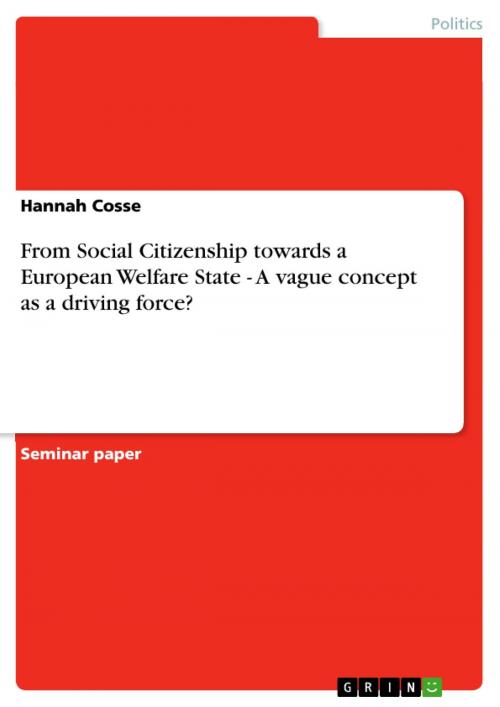From Social Citizenship towards a European Welfare State - A vague concept as a driving force?
A vague concept as a driving force?
Nonfiction, Social & Cultural Studies, Political Science| Author: | Hannah Cosse | ISBN: | 9783638625135 |
| Publisher: | GRIN Publishing | Publication: | March 16, 2007 |
| Imprint: | GRIN Publishing | Language: | English |
| Author: | Hannah Cosse |
| ISBN: | 9783638625135 |
| Publisher: | GRIN Publishing |
| Publication: | March 16, 2007 |
| Imprint: | GRIN Publishing |
| Language: | English |
Seminar paper from the year 2006 in the subject Politics - International Politics - Topic: European Union, grade: 1,0, University of Twente (School of Management and Governance), course: European Social Policies, 14 entries in the bibliography, language: English, abstract: In the past decades social policies in the European Union gained more competences and influence - at the same time core policies in this field, like education and health, are still regulated within the sovereignty of the nation states. Since the beginning of the development of the European Union in the 1950s economic considerations have been the core, drivers and barriers of most policies and steps on the way of the expansion from a mere economic cooperation to a somehow political union. Anyway, this focus will remain in the near future, but for a further economic integration a rethinking of the social policies within the Union is necessary - due to the fact that on the one hand economic integration generates pressures for the welfare states and especially for the people living in, or depending on, those states. Furthermore the past east-European enlargement introduced even more types of welfare states or welfare regimes to the already fragmented or nested set within the former 15 member states. On the other hand social policies are vital for the legitimacy of the 'government', which means in this deliberation the European Union as a whole. Democracies rely on the support of the people, thus further integration would need to be supported by the citizens of the European Union. One way of how people feel attached to a state is citizenship. The Maastricht-Treaty of the European Community established the 'European Citizenship' and the Europeans gained (at least formally) new rights. Classically citizenship is distinguished according to Marshall into a civil, a political and a social element. These different types of rights derive from a historically evolutionary process. Therefore the next alleged step in the EU would be the creation of social citizenship, which would imply a transfer of further social policies to the EU level, or even the shift from a 'regulatory state' to a system of entitlements, and therefore to a complete reorientation in the European social policy tradition, which might in the end lead to a European Welfare State. In the (scientific) debate about the future of the welfare state, social citizenship is among the concepts that are regarded as drivers - or even as necessary premises -for further integration in the social policy field. But: Citizenship is a vague concept; and European Social Citizenship is it even more.
Seminar paper from the year 2006 in the subject Politics - International Politics - Topic: European Union, grade: 1,0, University of Twente (School of Management and Governance), course: European Social Policies, 14 entries in the bibliography, language: English, abstract: In the past decades social policies in the European Union gained more competences and influence - at the same time core policies in this field, like education and health, are still regulated within the sovereignty of the nation states. Since the beginning of the development of the European Union in the 1950s economic considerations have been the core, drivers and barriers of most policies and steps on the way of the expansion from a mere economic cooperation to a somehow political union. Anyway, this focus will remain in the near future, but for a further economic integration a rethinking of the social policies within the Union is necessary - due to the fact that on the one hand economic integration generates pressures for the welfare states and especially for the people living in, or depending on, those states. Furthermore the past east-European enlargement introduced even more types of welfare states or welfare regimes to the already fragmented or nested set within the former 15 member states. On the other hand social policies are vital for the legitimacy of the 'government', which means in this deliberation the European Union as a whole. Democracies rely on the support of the people, thus further integration would need to be supported by the citizens of the European Union. One way of how people feel attached to a state is citizenship. The Maastricht-Treaty of the European Community established the 'European Citizenship' and the Europeans gained (at least formally) new rights. Classically citizenship is distinguished according to Marshall into a civil, a political and a social element. These different types of rights derive from a historically evolutionary process. Therefore the next alleged step in the EU would be the creation of social citizenship, which would imply a transfer of further social policies to the EU level, or even the shift from a 'regulatory state' to a system of entitlements, and therefore to a complete reorientation in the European social policy tradition, which might in the end lead to a European Welfare State. In the (scientific) debate about the future of the welfare state, social citizenship is among the concepts that are regarded as drivers - or even as necessary premises -for further integration in the social policy field. But: Citizenship is a vague concept; and European Social Citizenship is it even more.















